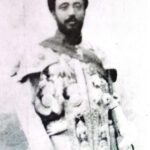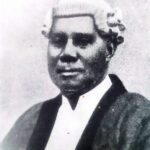GHARTEY, IV
- 4 Min Read
Ghartey IV (c. 1820-July 30, 1897), was King (Odefa) of Winneba, the port 35 miles (56 km) west of Accra, from 1872-97. He was also the first president of the Fante Confederation (1868-73), and a prominent figure in Gold Coast affairs in the latter part of the 19th century.

PHOTO CAPTION: Ghartey IV SOURCE: EA Library
Also known as Kwamin Akyempong, he was the son of Gyateh Kumah III of Winneba. His father’s name was Europeanised to “Ghartey” by Mynheer (Mr.) Stooves, a Dutch trader with whom he worked, and whose business he was later to purchase and turn into the firm of Ghartey Brothers.
He did not go to school, but as a boy went to sea as a cooper (cask repairer) for English, Portuguese, and Dutch ships, and learned to read and write. After one of his masters had been murdered, he gave up seafaring and worked at Apam, a fishing village 43 mi (69 km) west of Accra, in the Stooves’ Brothers factory (trading post). He served for 14 years with the firm at Anomabu, 5 mi (8 km) east of Cape Coast.
In 1861 he went to England with F. C. Grant, the Fante merchant prince, on a business tour, and there became a member of the Temperance Society, a branch of which he established at Anomabu. As a gift to the members of the society, he dug a well at Anomabu which was to remain the only source of pure water until the 1950s. He subsequently introduced the type of blouse known as the ‘kaba,’ or cover cloth. It was first used by his own maidservant, then by the women of his area, after which its use gradually spread throughout the country.
In 1862 he accompanied the superintendent of the Wesleyan Mission, Mr. William West, and also Prince J. Owusu Ansa, to Kumase on a mission tour. It was during this tour that he accurately measured the distance from the coast to Kumase – 120 miles (192 km) – and published it in 1864 in A Guide to Kumasi, a book that was to prove useful during the Sagrenti War of 1873-74, when Sir Garnet Wolseley led a British expedition to Kumase.
In 1867 he was appointed as treasurer, and later magistrate, of the Town Court by King Kofie Afedzie of Anomabu. In the same year the Fante Confederation was formed at Mankesim, 20 miles (32 km) northeast of Cape Coast, and Ghartey joined it as its first president. He led the Confederation government from Mankesim, and was successful in his administration of its justice and finances, sometimes borrowing money from his own firm to meet public expenditure. He came to be regarded by the Fante as ‘Governor of the Gold Coast,’ because of his wide powers, and because a British withdrawal was then expected.
He was then installed King of Winneba in 1872, and always opposed the alienation of his people’s lands by the British crown. He was nevertheless devoted to the British officials, even though he was an independent businessman who could afford to ignore then, since he did not depend on government service for his livelihood. Thus he professed loyalty to the Queen of England while at the same time opposing measures of the local administrators which he considered to be against the interest of the Africans.
He nevertheless helped the British in the Sagrenti War, and again in 1895 when they invaded Asante and occupied Kumase. In 1880 when all Winneba and the entire Simpa population (i.e. the population of Winneba and its environs, ‘Simpa’ being another name for Winneba) stood up for their ancient customs, Ghartey condoned their suppression by the British authorities. This seeming inconsistency may be due to his recognition of the power of imperial Britain, and his desire to maintain peace in order to increase trade and prosperity.
He was a man of deep religious convictions and sound moral principles, and a constitutionalist. He died at Winneba in 1897.
FRANCIS AGBODEKA




